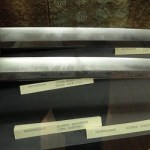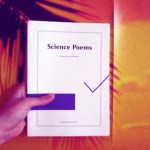Two Cultures
I got off on a bit of a rant the other day about bad defenses of "the humanities," but there's a bright side. It finally got me to write my own, over at Forbes, which is basically the last piece of a tetralogy of advice for students:
-- Why small colleges are a great place for students majoring in STEM subjects
-- What students planning to major in STEM subjects should make sure to do in college
-- Why non-STEM majors should nevertheless take science classes in college
-- Why STEM majors should take "humanities" classes, and take them seriously
That last one, posted yesterday, is my attempt…
Somebody in my social media feeds passed along a link to this interview with Berkeley professor Daniel Boyarin about "the humanities," at NPR's science-y blog. This is, of course, relevant to my interests, but sadly, but while it's a short piece, it contains a lot to hate.
For one thing, after the dismissive one-two of "so-called 'scientific methods'" (Scare quotes! "So-called"! Two great tastes that taste great together!) in the process of trying to re-brand "the humanities" as "the human sciences," Boyarin offers the following on methodology:
The primary method for the study of humans…
Everybody and their extended families has been sharing around the Fareed Zakaria piece on liberal education. This, as you might imagine, is relevant to my interests. So I wrote up a response over at Forbes.
The basic argument of the response is the same thing I've been relentlessly flogging around here for a few years: that while I'm all for a broad education, the notion that studying a STEM subject and studying "the human condition" are in opposition or even cleanly separable is just foolish. But it's a great excuse to start that argument at Forbes, so...
Yesterday was Founders Day at Union, celebrating the 220th anniversary of the granting of a charter for the college. The name of the event always carries a sort of British-boarding-school air for me, and never fails to earworm me with a very particular rugby song, but really it's just one of those formal-procession-and-big-speaker events that provide local color for academia.
This year's event started, as always, with a classical music performance-- a song by Aaron Copeland, this time, so we've at least caught up to the 20th Century. (I'm not sure I want to live long enough to see a Bob Dylan…
Also coming to my attention during the weekend blog shutdown was this Princeton Alumni Weekly piece on the rhetoric of crisis in the humanities. Like several other authors before him, Gideon Rosen points out that there's little numerical evidence of a real "crisis," and that most of the cries of alarm you hear from academics these days have near-perfect matches in prior generations. The humanities have always been in crisis.
This wouldn't be worth mentioning, but Rosen goes on to offer an attempt at an explanation of why the sense of crisis is so palpable within the humanities, an explanation…
As a follow-up to yesterday's post about liberal education and the failure modes thereof, I thought I should try to do something constructive and make suggestions regarding how you might go about a "poetry for physicists" kind of thing. After all, one of the things I find intensely frustrating about a lot of "crisis in ____" discussions is the lack of specific suggestions, so throwing out a "here's a problem, good luck with that" post would be suboptimal behavior on my part. This required some reflection on the question of just what I got out of my "liberal arts" classes back in the day--…
In a comment to yesterday's post about the liberal arts, Eric Lund makes a good point:
The best argument I have ever heard for doing scholarship in literature and other such fields is that some people find it fun.
I single this out as a good point not because I want to sneer at the literary disciplines, but because with a little re-wording, this could apply to just about anything. The best reason for studying any academic subject is because it's fun.
This is, as I alluded to in a later comment of my own, a significant source of tension for Delbanco's book and a lot of other arguments about…
Sunday evening, as a part of the kick-off to the new academic year, we had a talk by Andrew Delbanco, a professor at Columbia and the author of College: What It Was, Is, and Should Be. This was intended as a sort of affirmation of the importance of the sort of educational experience Union offers, but ultimately, I found it pretty frustrating.
Admittedly, a lot of that was because the talk was at an inconvenient time, 5pm on a Sunday evening being a point when I would normally be home making dinner for the family. Sunday is a school night, to boot, so I needed to get home for dog-walking and…
The stupid Steven Pinker business from a few weeks ago turned out to do one good thing after all. It led to this post at Making Science Public, which quoted some books by Jacob Bronowski that sounded relevant to my interests. And, indeed, on checking The Common Sense of Science out of the college library, I opened it up to find him making one of the arguments of my book for me:
Many people persuade themselves that they cannot understand mechanical things, or that they have no head for figures. these convictions make them feel enclused and safe, and of course save them a great deal of trouble…
A lot has been written about Steven Pinker's article about "scientism," most of it mocking his grandiose overreach in passages like this:
These thinkers—Descartes, Spinoza, Hobbes, Locke, Hume, Rousseau, Leibniz, Kant, Smith—are all the more remarkable for having crafted their ideas in the absence of formal theory and empirical data. The mathematical theories of information, computation, and games had yet to be invented. The words “neuron,” “hormone,” and “gene” meant nothing to them. When reading these thinkers, I often long to travel back in time and offer them some bit of twenty-first-…
Via a retweeted link from Thony C. on Twitter, I ran across a blog post declaring science a "bourgeois pastime." The argument, attributed to a book by Dierdre McCloskey is that rather than being at the root of economic progress, scientific advances are a by-product of economic advances. As society got more wealthy, it was able to direct more resources to science, which made great advances possible.
And, you know, if you're looking to make a bold and contrarian argument, you can certainly do that. Unfortunately, the bit quoted from McCloskey as an illustration of the power of the argument is:…
In my darker moods, I sometimes suspect that all academics, regardless of their specialty, are engaged in the same pursuit: searching out and exposing the systematic oppression of... whatever department or program the faculty member speaking at the moment happens to belong to. No matter what field of study they work in, faculty seem to cultivate and even cherish a sense of victimhood. Somebody else has a bigger office, or a newly renovated building, or more support from the administration for their pet projects. Faculty with big offices and renovated space complain about the location, and…
In which I get a little rant-y about yet another proud display of ignorance from the Washington Post's education blog.
------------
Some time back, I teed off on a school board member who couldn't pass a simple math test, who proudly told the world about his ignorance via a post at the Washington Post's education blog. Bragging about ignorance is apparently a Thing for that blog, which recently offered another fine example, with a parent complaining about his son being forced to take chemistry. The author, "nonprofit executive" David Bernstein, is a former philosophy major, who evidently didn…
(Note: This was not prompted by any particular comment. Just a slow accumulation of stuff, that turned into a blog post on this morning's dog walk.)
It's been a couple of years now that I've been working on writing and promoting How to Teach Physics to Your Dog, so I've had a lot of conversations where the subject of writing a popular audience book on quantum physics comes up. I've had enough of these now that I can recognize a few different categories of responses, one of which drives me up the wall. I suspect that the same is true for most pop-science authors, so as a public service, let me…
I recently participated in a survey of higher education professionals about various aspects of the job. It was very clearly designed by and aimed at scholars in the humanities and social sciences, to the point where answering questions honestly made me feel like a Bad Person.
For example, there were numerous questions about teaching methods that just aren't applicable to what I teach-- things like learning through community service. while there is some truth to the old cliche that you never really learn something until you have to teach it, something like turning a bunch of would-be engineers…
Earlier this year, I received a charming email from a pair of Helsinki-based artists and designers who work under the name of OK DO. OK DO is a socially-minded design think tank and online publication; they dug Universe and wanted to know if I'd contribute to a new publication and exhibition project they were working on. The project, Science Poems, was perfectly up my alley: a variety of articles and work loosely structured around the "poetry and multi-sensorial aesthetics of natural sciences rather than their functionality and logic."
For the occasion, I wrote a short piece about the…
I was initially puzzled by the headline "Research-Assignment Handouts Give Students Meager Guidance, Survey Finds," and the opening sentences didn't help much:
Most research-assignment handouts given to undergraduates fail to guide the students toward a comprehensive strategy for completing the work, according to two researchers at the University of Washington who are studying how students conduct research and find information.
My initial reaction was "If I could give them a comprehensive strategy for completing the work, it wouldn't be research." Then I noticed the last three words, and…
Back in one of the communications skills threads, Karen comments about science and humanities:
It's easy enough for a humanities major to avoid doing much science in school. The converse is not true. It strikes me that for those earlier scientists who attended univeristy, both their early education and university years were more suited to focusing on the science.
This relates to the communication issue as this often means that the science inclined are often put in a position of being evaluated on their communication in area that are areas of weakness for them, those areas where communications…
I hate to keep highlighting silly articles in Inside Higher Ed, but they keep publishing silly articles, like Jeffrey DiLeo's argument that humanities journals cannot be ranked because they're all unique and precious flowers too specialized:
Another reason for the roaring silence regarding the ranking of humanities journals regards the high level of sub-disciplinary specialization. In philosophy, there are journals devoted to general areas of philosophy (e.g., logic, metaphysics, ethics, aesthetics, etc.), to sub-areas of general areas of philosophy (e.g., medical ethics, business ethics,…
A great clip from his World Science Festival appearance the other night, especially the bit toward the end:
"One thing I think that as a nation we should be embarrassed by is that the scientists-- you can do this experiment yourself, I've done the experiment-- the scientists, by and large, know more liberal arts than the science that is known by liberal artists."
Or you can read my longer, less funny version from a couple of years ago. Either way, it's an important message: It should be exactly as embarrassing in educated company to say "I'm no good at math" as it would be to say "I'm no…


